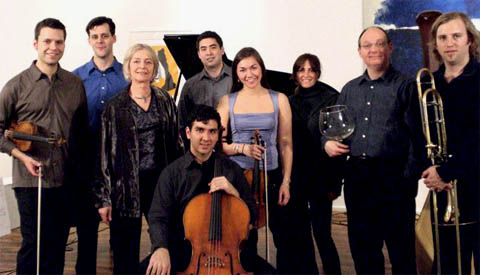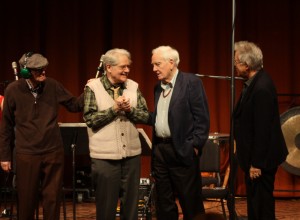 Strata – a trio consisting of pianist Audrey Andrist, clarinetist Nathan Williams, and violinist/violist James Stern – has just started a new commissioning project. Abetted by a grant from the Rauch Foundation, their Metaclassical Music Project seeks to bridge the gap between new music and the non-specialist audience through educational outreach and the commissioning of new works that seek to communicate with a range of listeners.
Strata – a trio consisting of pianist Audrey Andrist, clarinetist Nathan Williams, and violinist/violist James Stern – has just started a new commissioning project. Abetted by a grant from the Rauch Foundation, their Metaclassical Music Project seeks to bridge the gap between new music and the non-specialist audience through educational outreach and the commissioning of new works that seek to communicate with a range of listeners.
Phase one of Strata’s “demystification” of contemporary fare involves presenting a new piece by Stephen Paulus on a concert this weekend at Merkin Hall (details below). Paulus is certainly a composer who fits their mission statement: an artist who doesn’t water down his language (and can indeed sound quite ‘modern’ in places) but has managed to craft a body of work that speaks to many “mainstream” classical listeners.
Alongside Paulus’ Trio Concertant, Strata will present works by Robert Maggio, Jonathan Leshnoff, and Béla Bartók’s Contrasts. I recently caught up with Stern to discuss the concert, as well as Strata’s future plans for the Metaclassical Music project.
Sequenza 21: Tell me a bit about the background and formation of Strata.
Stern: Strata is an ensemble that grew out of friendships formed at the Juilliard School. Audrey and I began dating while we were both graduate students there, and then Audrey met Nathan in a doctoral seminar they were both taking after I had moved away to take a job at the Cleveland Institute. So far we’ve never all three lived in the same city, but Audrey and I got married a few years later, while Nathan’s career was taking him all over the world with a succession of teaching positions and performing. Despite the geographical obstacles, the three of us got serious about developing a repertoire and performing throughout the North American continent. I also got serious about playing viola so as to augment our repertoire possibilities. We chose the name “Strata” (layers) in recognition of a fondness that we all share for the intricacies of counterpoint (many-layered music), as well as a commitment to uncovering many layers of meaning in what we play.
Sequenza 21: What’s the concept behind your new commissioning project?
Stern: The Metaclassical Music Project began with the idea that a composer might be able to facilitate the educational outreach presentations that we do. What if, for example, a single melody could be cast successively in monophonic, homophonic and then polyphonic textures of gradually increasing complexity? Then we would have an array of examples to explain these ideas to a young audience and this would, in turn, help to illuminate other standard repertoire we play for them. Next, what if such an array of musical demonstrations actually formed part of a large-scale concert piece; that is what if, in addition to their educational function, they created a coherent emotional trajectory that added up to an intense concert experience? This is where the idea started. But it evolved into something more general: what happens to an artist’s self-expression when she or he takes on the commitment to instruct? I actually believe that composers like Shostakovich, and writers like Milan Kundera and Herman Melville have done this: they write in what I like to call the “didactic voice,” and that this is part of the key to the immense power they achieve.
Sequenza 21: How did you decide to commission Stephen Paulus?
Stern: Nathan first encountered Paulus when he participated in a performance of one of Paulus’s operas. He was deeply struck by the color and imagination of the writing. Somewhat later I performed Paulus’s Partita Appassionata, at the Cosmos Club of Washington D.C., with my University of Maryland colleague, pianist Bradford Gowen. Paulus was being inducted into the Cosmos Club, which was described by the late Wallace Stegner as “the closest thing to a social headquarters for Washington’s intellectual elite.” Their website goes on to report: “Among its members, over the years, have been three Presidents, two Vice Presidents, a dozen Supreme Court justices, 32 Nobel Prize winners, 56 Pulitzer Prize winners and 45 recipients of the Presidential Medal of Freedom.” Strata has also performed there. Two things struck me on this occasion. One was how easy Paulus’s music made it for us, as performers, to connect with an audience. The energy in the room was wonderful. The other was hearing Paulus speak about his music. With regard to a song cycle that was being performed that evening he described, with evident enjoyment, how he had deliberately written one of the songs using the twelve-tone technique, just to prove that it could be done in a way that was attractive and not intimidating. This was the kind of creativity and exuberance we were looking for with the Metaclassical Music Project.





